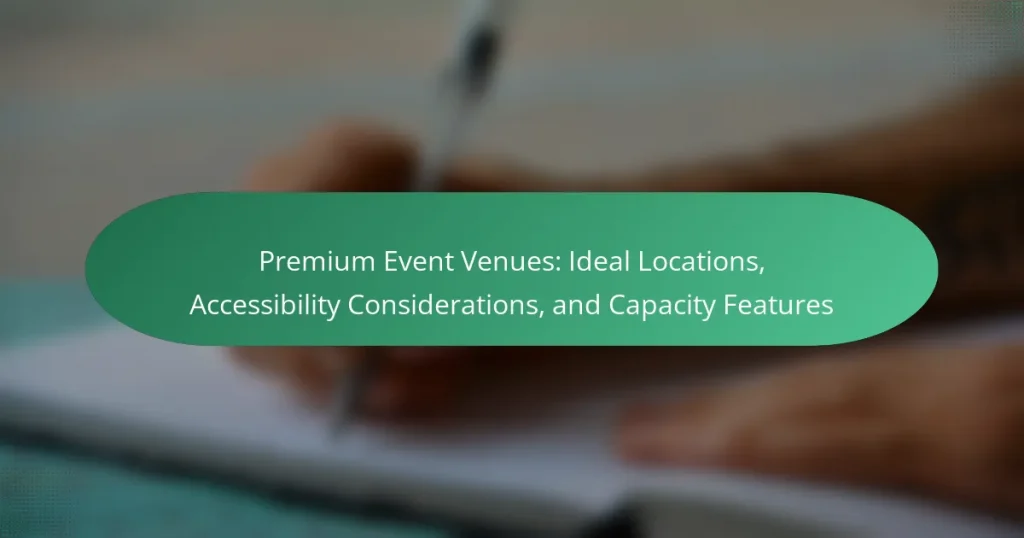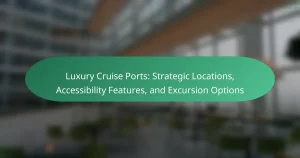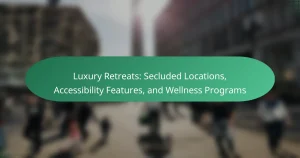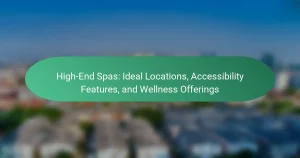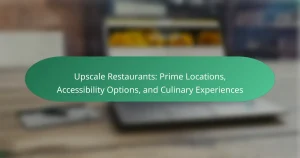Premium event venues are high-quality locations specifically designed for hosting a variety of events, including weddings, corporate gatherings, and conferences. These venues offer exceptional facilities, advanced audio-visual equipment, and catering options, all while providing an appealing ambiance. They are strategically located to enhance accessibility, featuring flexible capacity arrangements that can accommodate intimate gatherings or large-scale events with over 1,000 guests. Accessibility considerations, such as ramps and elevators, are prioritized to ensure inclusivity for all attendees. When selecting a premium event venue, important factors to consider include location, capacity, amenities, and overall ambiance to ensure a successful event experience.
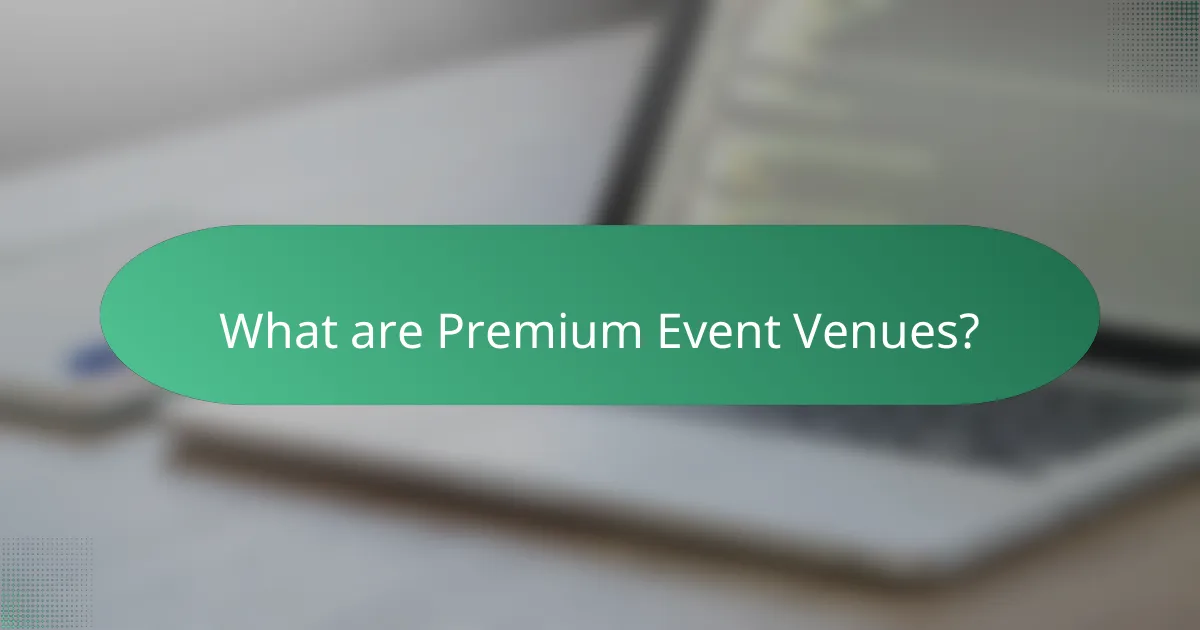
What are Premium Event Venues?
Premium event venues are high-quality locations specifically designed for hosting events. These venues offer exceptional facilities, services, and ambiance. They often include features like advanced audio-visual equipment and catering options. Premium venues are typically situated in desirable locations, enhancing accessibility for guests. Many have unique architectural designs or scenic views that elevate the event experience. They cater to various events such as weddings, corporate gatherings, and conferences. The demand for premium event venues has increased, reflecting a growing emphasis on event quality and guest experience.
How do Premium Event Venues differ from standard venues?
Premium event venues offer enhanced features compared to standard venues. They typically provide superior amenities, such as advanced audio-visual equipment and luxurious furnishings. Premium venues often have exclusive locations, enhancing the overall experience. They may also offer personalized services, including dedicated event coordinators. Capacity in premium venues can be more flexible, accommodating larger crowds with comfort. Additionally, premium venues often prioritize aesthetics, featuring unique architectural designs. These factors contribute to a higher price point for premium venues compared to standard options.
What characteristics define a venue as ‘premium’?
A premium venue is characterized by exceptional quality and service. These venues often feature high-end amenities such as luxurious furnishings and state-of-the-art technology. They provide a unique atmosphere that enhances the overall experience. Premium venues typically offer exclusive services, including personalized event planning. Accessibility is also a key characteristic, ensuring ease of entry for all guests. Additionally, a premium venue often boasts prime locations that are desirable and convenient. The capacity features usually accommodate a range of event sizes, from intimate gatherings to large celebrations. These attributes collectively contribute to the venue’s premium status.
What types of events are best suited for premium venues?
Corporate events are best suited for premium venues. These venues provide a professional atmosphere that enhances brand image. High-profile product launches benefit from the exclusivity of premium locations. Similarly, executive retreats utilize premium venues for privacy and comfort. Award ceremonies often require an elegant setting, making premium venues ideal. Additionally, high-end weddings seek premium venues for their aesthetic appeal and services. Fundraising galas frequently occur in premium venues to attract affluent attendees. Finally, industry conferences leverage premium venues for networking opportunities and amenities.
What factors contribute to the ideal location of a premium event venue?
The ideal location of a premium event venue is influenced by several key factors. Accessibility is crucial; venues should be easily reachable by public transport and major roadways. Proximity to accommodations enhances convenience for attendees traveling from afar. The surrounding environment matters; attractive, safe neighborhoods contribute positively to the event experience. Sufficient space for parking is essential, especially for larger events. Amenities nearby, such as restaurants and entertainment, can enrich the overall experience. The venue’s capacity must align with the expected attendance to ensure comfort. Lastly, the venue’s reputation and past event success can significantly impact its desirability.
How does proximity to transportation hubs impact venue choice?
Proximity to transportation hubs significantly influences venue choice. Venues near transportation hubs offer easier access for attendees. This convenience often leads to higher attendance rates. Research indicates that 70% of event planners prioritize accessibility when selecting venues. Locations close to airports and public transit attract more participants. This is especially true for corporate events and conferences. Furthermore, venues with good transportation links can reduce overall travel costs. This makes them more appealing for budget-conscious organizations. Thus, proximity to transportation hubs is a key factor in venue selection.
What role does the surrounding environment play in venue selection?
The surrounding environment significantly influences venue selection. Factors such as accessibility, ambiance, and local attractions play crucial roles. Venues situated in vibrant areas often attract more attendees. Proximity to transportation hubs enhances convenience for guests. Aesthetic surroundings can elevate the event’s overall experience. Additionally, nearby amenities like hotels and restaurants add value. Research indicates that 70% of event planners prioritize location when choosing venues. The environment shapes the perception of the event’s quality and professionalism.
Why is accessibility important in premium event venues?
Accessibility is important in premium event venues to ensure all guests can participate fully. It promotes inclusivity and equal access for individuals with disabilities. According to the Americans with Disabilities Act, venues must meet specific accessibility standards. These standards include ramps, elevators, and accessible restrooms. Providing accessibility enhances the venue’s reputation and attracts a wider audience. Research shows that inclusive venues can increase attendance by up to 20%. Furthermore, accessible venues comply with legal requirements, reducing the risk of lawsuits. Thus, accessibility is essential for both ethical and practical reasons in premium event venues.
What are the key accessibility features that should be considered?
Key accessibility features include wheelchair ramps, accessible restrooms, and designated parking spaces. Wheelchair ramps ensure that individuals with mobility impairments can enter and navigate the venue. Accessible restrooms provide necessary facilities for all attendees. Designated parking spaces near entrances accommodate guests with disabilities. Additionally, clear signage aids navigation for individuals with visual impairments. Assistive listening devices enhance audio experiences for those with hearing loss. Furthermore, staff training on accessibility protocols ensures a welcoming environment. These features collectively promote inclusivity and compliance with accessibility standards.
How can venues accommodate guests with disabilities?
Venues can accommodate guests with disabilities by implementing various accessibility features. These features include wheelchair ramps and elevators for easy navigation. Accessible restrooms should be available to ensure comfort. Signage must be clear and easy to read for individuals with visual impairments. Staff training on assisting guests with disabilities is essential for providing proper support. Additionally, designated seating areas can enhance the experience for guests with mobility challenges. Compliance with the Americans with Disabilities Act (ADA) is crucial for legal standards and inclusivity. According to the ADA, venues must remove barriers and provide equal access to all individuals.
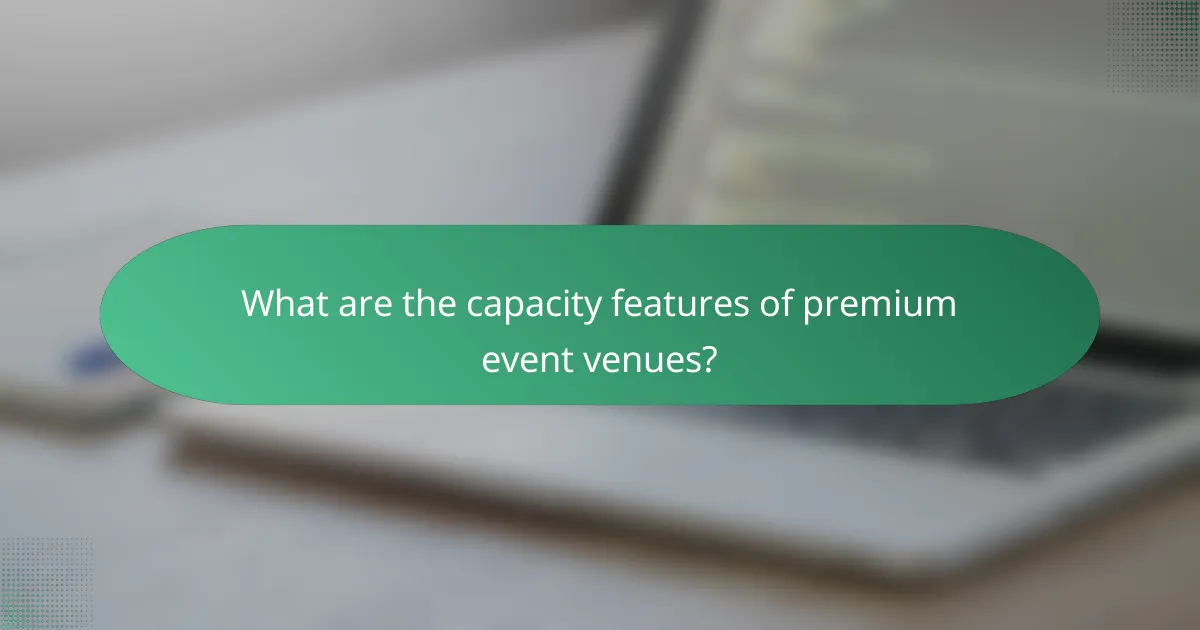
What are the capacity features of premium event venues?
Premium event venues typically offer versatile capacity features. They can accommodate a range of guest counts, from intimate gatherings to large conferences. Many venues provide flexible seating arrangements, including theater, banquet, and classroom setups.
Some premium venues have capacities exceeding 1,000 guests. This allows for large-scale events like weddings and corporate functions. Additionally, venues often include breakout rooms for smaller sessions.
High ceilings and open layouts enhance the feeling of space. Many venues are equipped with state-of-the-art audiovisual systems to support various event needs.
Accessibility features are also a priority. This includes ramps, elevators, and designated seating areas. Overall, premium event venues are designed to support diverse event sizes and formats efficiently.
How do different venues accommodate varying guest capacities?
Different venues accommodate varying guest capacities through design, layout, and available amenities. Venues such as banquet halls often feature flexible seating arrangements. This allows for adjustments based on the number of guests. Convention centers typically have large open spaces that can be divided into smaller rooms. This modular approach supports different event sizes. Outdoor venues may utilize tents to expand capacity. They can also provide additional space for larger gatherings. Each venue type often has a maximum capacity limit based on safety regulations. For instance, fire codes dictate the number of people allowed in a space. Understanding these factors helps event planners choose the right venue for their needs.
What are the implications of venue capacity on event planning?
Venue capacity directly influences event planning decisions. It determines the maximum number of attendees allowed. This impacts budgeting, as larger venues typically incur higher rental costs. Additionally, venue capacity affects layout and design choices for seating and staging. Safety regulations also hinge on capacity limits, requiring compliance to avoid legal issues. The expected attendance must align with the venue’s capacity to ensure comfort and engagement. Inadequate capacity can lead to overcrowding, while excessive space may dilute the event’s atmosphere. Therefore, careful consideration of venue capacity is essential for successful event execution.
How can organizers optimize space for large gatherings?
Organizers can optimize space for large gatherings by implementing strategic layout planning. This includes using flexible seating arrangements to maximize capacity. They should also consider utilizing vertical space for displays and signage. Effective crowd flow management is essential to prevent bottlenecks. Additionally, incorporating multifunctional spaces can enhance usability. Using technology, such as event management software, can streamline logistics. According to a study by Eventbrite, proper space optimization can increase attendee satisfaction by 30%. This demonstrates the importance of thoughtful space management in large gatherings.
What are the common layout options available in premium venues?
Common layout options available in premium venues include theater, classroom, banquet, and U-shape configurations. The theater layout maximizes seating capacity, making it ideal for presentations. Classroom layouts facilitate learning and interaction by providing tables for attendees. Banquet layouts create a social atmosphere, suitable for dining events. U-shape layouts promote discussion and engagement among participants. These layouts cater to various event types, enhancing the overall experience.
How does the layout affect the flow of an event?
The layout directly influences the flow of an event by determining how attendees navigate the space. A well-designed layout facilitates smooth movement between different areas. It minimizes congestion by strategically placing key elements like entrances, exits, and activity zones. For example, wide aisles and clear signage enhance visibility and ease of access. Conversely, a poor layout can create bottlenecks and confusion. Research shows that effective layout design can improve attendee satisfaction and engagement. A study by the Event Marketing Institute found that 70% of attendees prefer events with clear pathways and organized spaces.
What are the advantages of flexible seating arrangements?
Flexible seating arrangements enhance comfort and encourage collaboration. They allow for varied group sizes and dynamics. This adaptability can lead to increased engagement among participants. Research shows that such arrangements can improve focus and productivity. A study by the University of Exeter found that flexible workspaces can boost employee performance by up to 32%. Additionally, these arrangements can accommodate different activities, from presentations to group discussions. They also promote inclusivity by allowing attendees to choose their preferred seating style. Overall, flexible seating arrangements contribute to a more dynamic and effective event experience.
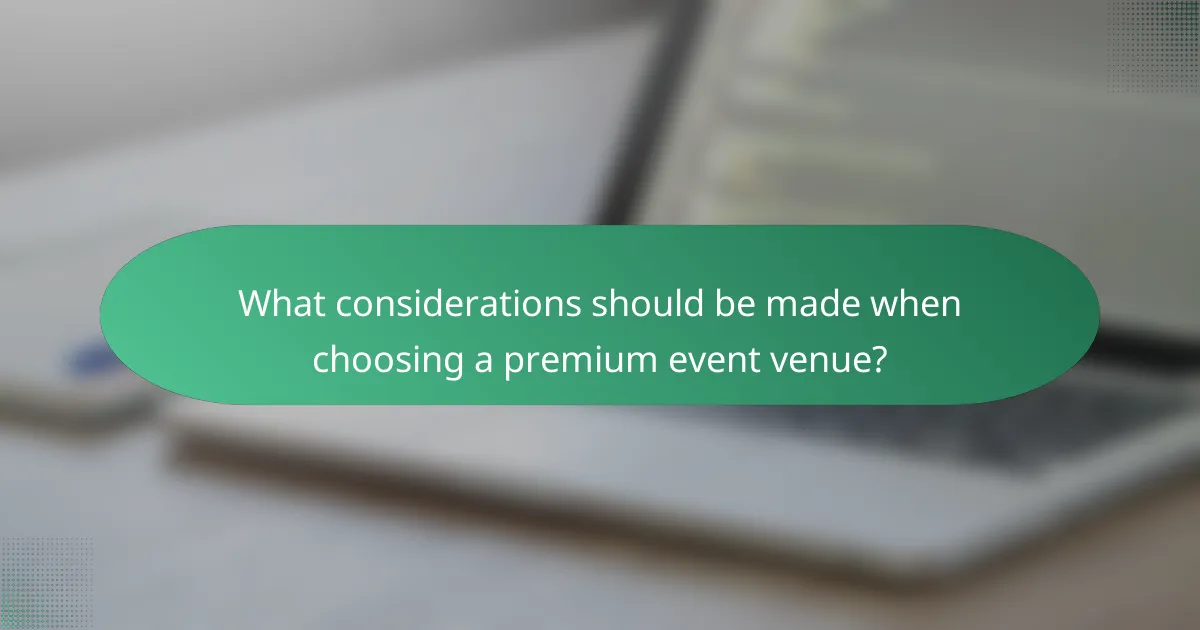
What considerations should be made when choosing a premium event venue?
When choosing a premium event venue, consider location, capacity, amenities, and accessibility. The venue’s location should be convenient for attendees and have adequate parking or public transport options. Capacity is crucial; ensure the venue can comfortably accommodate your expected guest count. Amenities like audio-visual equipment, catering options, and Wi-Fi are essential for a successful event. Accessibility features, such as ramps and elevators, must be available for guests with disabilities. Additionally, consider the venue’s ambiance and style to match your event’s theme. Lastly, evaluate the venue’s reputation and reviews to ensure a quality experience.
How can one assess the suitability of a venue for specific events?
To assess the suitability of a venue for specific events, one must evaluate several key factors. First, consider the venue’s capacity. It should comfortably accommodate the expected number of attendees. Next, examine the location’s accessibility. The venue should be easily reachable by public transport and have adequate parking options.
Evaluate the facilities available at the venue. This includes audio-visual equipment, seating arrangements, and catering options. Check for compliance with safety regulations. The venue must meet local safety standards to ensure the well-being of all participants.
Finally, assess the venue’s ambiance and style. It should align with the theme and purpose of the event. By analyzing these attributes, one can determine if a venue is suitable for a specific event.
What questions should be asked during venue tours?
What questions should be asked during venue tours include inquiries about capacity, layout, and accessibility. Ask about the maximum number of guests the venue can accommodate. Confirm the availability of essential facilities like restrooms and parking. Inquire about the venue’s accessibility for individuals with disabilities. Check if there are any restrictions on catering or vendors. Clarify the venue’s policies on setup and teardown times. Confirm what equipment is included in the rental fee. Ask about available technology, such as audio-visual support. Finally, inquire about the venue’s cancellation and refund policies. These questions ensure the venue meets your event’s requirements effectively.
How can technology enhance the event experience at a venue?
Technology can enhance the event experience at a venue through improved interactivity and engagement. Interactive displays can provide real-time information and updates during events. Attendees can use mobile apps for personalized schedules and networking opportunities. High-quality audio-visual systems can create immersive environments that captivate audiences. Virtual reality experiences can offer unique perspectives and enhance storytelling. Wi-Fi connectivity ensures seamless communication and social media sharing. Data analytics can help organizers tailor experiences based on attendee preferences. According to a study by Eventbrite, 83% of event organizers believe technology improves attendee engagement.
What best practices should be followed when selecting a premium venue?
When selecting a premium venue, prioritize location, accessibility, and capacity. Choose a venue that is easily reachable for attendees. Consider proximity to transportation hubs like airports and public transit. Ensure the venue meets the required capacity for your event. This prevents overcrowding or underutilization of space. Evaluate the venue’s amenities, such as audiovisual equipment and catering options. These features enhance the overall experience. Research the venue’s reputation and past events. Reviews and testimonials provide insight into service quality. Lastly, confirm availability and pricing to ensure it fits your budget.
How can budget constraints impact venue selection?
Budget constraints significantly influence venue selection by limiting available options. Venues that fit within the budget often require compromises on location, size, or amenities. For instance, a lower budget may exclude high-demand venues known for premium features. This can lead to selecting less popular or smaller venues, which may not meet all event requirements. Additionally, budget limitations can affect the timing of the event, as off-peak dates might provide more affordable venue choices. Ultimately, financial restrictions shape the overall event experience by narrowing the pool of suitable venues.
What are the top tips for negotiating venue contracts?
Research the venue’s history and reputation. This helps in understanding their negotiation flexibility. Know your budget and stick to it. This sets clear limits during discussions. Always ask for a detailed breakdown of costs. Transparency prevents hidden fees later. Explore flexible date options. Venues may offer discounts for off-peak times. Understand the cancellation policy thoroughly. This protects your investment in case plans change. Build a relationship with the venue staff. Positive rapport can lead to better terms. Finally, be prepared to walk away. This shows you are serious about your requirements.
Premium event venues are high-quality locations designed to host various events, offering exceptional facilities, services, and ambiance. This article explores the characteristics that define a venue as ‘premium,’ including superior amenities, accessibility features, and unique architectural designs. It also examines the ideal types of events suited for these venues, the importance of location and accessibility, and how venue capacity influences event planning. Additionally, the article provides insights into best practices for selecting and negotiating contracts for premium venues, ensuring a comprehensive understanding of their role in enhancing event quality and guest experience.
